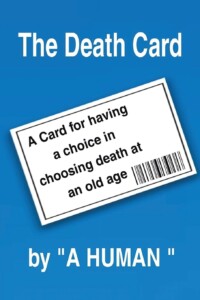Title: The Death Card
Author: A Human
Publisher: XlibrisUS
ISBN: 979-8369414439
Pages: 78
Genre: Philosophy of Living
Reviewed by: Rahul
Pacific Book Review
When we sit and stare into nothingness, we might encounter thoughts related to our
mortality and how we would like to say goodbye to this journey called life. Should we go
happily or in anguish due to disease? What if your final chapter was a choice, not a
sentence? The Death Card is a thoughtful book that looks at the idea of choosing when
to die, especially as we get older and face difficult health issues. The book is deep and
easy to read, making you think about your views on aging and death.
The author’s narrative feels personal and relatable. The main character shares their
worries about getting old and possibly losing their independence. For example, in the
first part of the book, the main character wonders, “Why is it that we humans cannot
choose for ourselves for how long to endure the old age and the loneliness, and to be
able to die when we feel it is time to go?” It sets the stage for the rest of the book, which
explores this big question in detail.
The book takes a balanced view of voluntary death as conscious choices for the greater
good, like wartime sacrifices. It challenges traditional views on suicide and assisted
dying, presenting them as rational ways to relieve suffering. Personal stories, like an old
man caring for his paralyzed wife, emphasize the emotional and physical strain of
caregiving, highlighting the need for compassionate end-of-life options.
The book is well-structured, with each chapter supporting the previous one to deepen
the exploration of its central themes. The tone is compassionate and reflective,
encouraging readers to approach the topics with empathy and an open mind. The use
of clear, concise language and relatable anecdotes makes the book highly readable,
ensuring its appeal to a diverse audience.
To give you an idea of the depth and thoughtfulness of the narrative, consider these
quotes: “What do you want from this world and what do you want from this life?” is
about control over one’s life and a dignified end. Another powerful statement, “If we live
in an unnatural environment, seeking permission to die unnaturally could be justified,”
challenges readers to consider the legitimacy of choosing to end one’s life in the context
of modern societal conditions.
The only negative of the book is the pessimism towards old age. Instead of the death
card, the author could have asked the young to take care of themselves so they don’t
become dependent on old age because of a bad lifestyle. Or, ask social entrepreneurs
to solve the problem and come up with a model where the young can take care of the
old. This would reduce the number of elderly people who want the death card.
The Death Card is a siren song, luring us into a dangerous and alluring realm. In a
world obsessed with life extension comes a book that dares to question its sanctity. The
book is perfect for anyone who wants to explore the important questions about aging,
dignity, and the end of life.
The Death Card is a poignant and thought-provoking read that will resonate with anyone
interested in end-of-life issues, and the complex choices we face in our final days. is not
just a book about death; it is a book about life, love, and the choices we make to
preserve our dignity and autonomy. It encourages readers to engage in conversations
about end-of-life decisions and to consider what quality of life means to them. The
Death Card is a book that inspires reflection on our values, beliefs, and the importance
of living life on our terms.


